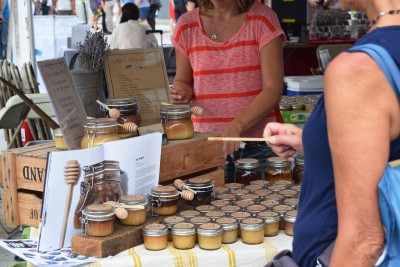
Without bees, there can’t be humans.
This is what Ariel Krolick, owner of Ariel’s Honey Infusions, has been telling customers, eager to spread the word about the effect bees have on our food sources. This is why she was so excited to team up with Boston-based Olives and Grace, a small artisan gift shop tucked away in Boston’s South End that promotes handmade products as “a curtsy to the makers,” as their store slogan says.
“It’s all small businesses,” said Sofi Madison, owner of Olives and Grace. “Everything is hand-crafted, everything is made in the U.S. So the focus is supporting small businesses who have sustainable products.”
As part of Olives and Grace’s Meet the Maker series, the store featured Vermont-based Ariel’s Honey Infusions on Saturday to give a tasting of handmade honey and promote sustainable beekeeping.
“We really love what she stands for and how pure her raw honey is, so we’ve been carrying her honey for a couple of years now,” Madison said.
Olives and Grace’s space isn’t large, but it’s packed with handcrafted jewelry, 100 percent soy candles, watercolor posters, recycled stationary, hormone-free dog treats and, of course, the raw, unprocessed honey.
It makes for the ideal spot to hold a celebration for organic sweets.
“It’s all raw honey, sustainably harvested,” Krolick said. “So there’s no pesticides or sprays used in the beekeeping or on the bees. All the herbs in the honey are organic, so the longer they stay in the honey, the stronger those infusions become.”
Though the process is long, Krolick does it all. She works with the beehives, makes the honey and distributes it. By taking raw honey straight from the hive, it keeps many of the natural properties needed to stay healthy, Krolick said.
This process preserves vitamins, enzymes and nutrients, but also provides for creative uses in food and drinks, according to Ariel’s Honey Infusion’s website. The honey can be mixed into tea, used for baking, drizzled onto oatmeal and yogurt, spread on toast or even eaten by the spoonful, Krolick said.
Krolick’s display Saturday included honey flavored with chai, lavender and rose, hot pepper and elderberry infusions, among many others, all open for sampling. These unique flavors intrigued attendees, pushing them to ask about the sustainable beekeeping efforts in Boston.
“I definitely think it’s an important movement,” said attendee Alexandra Klotz, 25, of Cambridge. “It’s kind of interesting because I feel like it’s become this hipster, ‘bougie’ movement and that oftentimes means it gets a lot of attention. I hope people will stay interested in it after it’s no longer a fad.”
Alexandria Mello, clerk of the office at The Best Bees Company, agrees that many of the current efforts look like a popular trend at this point.
“In order for long-term change to happen, I think that there needs to be advocacy for much longer than a few years,” Mello said.
And it looks like organizations such as Ariel’s Honey Infusions and The Best Bees Company plan to keep at it for a while.
The Best Bees Company is a nationwide beekeeping service that delivers, installs and manages beehives. Though headquartered in Boston, The Best Bees Company caters to businesses and residences throughout New England, New York City, Washington D.C., Los Angeles, Chicago, Denver, Seattle and San Francisco, according to their website. But spreading the word is still key.
Echoing this sentiment, Krolick said she plans to continue her efforts in educating the public about the importance of the bee population. Any little thing helps, she said. Even creating a small garden. Even planting a few pollinator-friendly plants. After all, she said, without pollinators, our grocery stores would be nearly devoid of fruits and vegetables. About 70 percent of our food sources are reliant on the pollination of insects, according to Ariel’s Honey Infusion’s website.
“If we didn’t have bees, we’d have a really big problem,” Krolick said.
But Krolick is currently selling her honey to five stores in Boston and a handful of shops in Greater Boston, including Follow The Honey, Cambridge Naturals and The Olive Connection. She’s determined to make an impact, and fortunately, she’s not alone.
“As long as it’s still getting attention and people are still working on it,” Klotz said, “well, that makes me happy.”

























































































































Sustainable Beekeeping • Sep 24, 2016 at 10:55 am
Another way for beekeepers to go sustainable is to start with a sustainable beekeeping system that is focused on healthy hives over honey production. An example would be Beepods that sells sustainable beekeeping systems across the US including equipment, training, and support for beekeepers to have success promoting healthy hives – https://www.beepods.com